We've got paper [Ákwụ́kwọ́ dị́]
![We've got paper [Ákwụ́kwọ́ dị́]](/content/images/size/w960/2022/08/Screen-Shot-2022-08-26-at-9.01.40-AM-1.png)
I have seen men with haunting voices
turned into ghosts by a piece of white paper
as if their eloquence had been black magic.
—Arthur Nortje - from "Soliloquy: South Africa"
For those that can dance and clap your hands to it
I start to think and then I sink
Into the paper like I was ink
When I'm writing, I'm trapped in between the lines,
I escape when I finish the rhyme
—Rakim (Eric B. & Rakim) - from "I Know you Got Soul"
Yeah I need a paperclip
I'm stacking up this paper, man
And I could make that paper flip
That paper flip, paper flip
Watch me make that paper flip
—Paper Boi - from "Paper Boi" (Atlanta TV Script)
OK OK I mean the book. Ákwụ́kwọ́ in Ìgbò shifts into a variety of meanings, from "leaf" to "paper" to "book" to "studies", but as a B-Boy (an Igbo B-Boy, nonetheless), the idea of "getting that paper" is never far from my mind.
Ńchéfù Road is available on order from booksellers worldwide (ISBN-13: 978-1-913606-93-0), and I'm selling signed copies as well—authors usually get more of the proceeds if you purchase from us directly. Worth mentioning because really strange things tend to happen with pricing out there, especially among online booksellers.
The day after my wholesale shipment of books arrived I drove into the Rockies, Sangre de Cristo and San Juan mountains to have a lovely evening in Salida DJing to the poetry of others (when they chose for me to join them), and then performing an Ńchéfù Road music/poetry set of my own.
Afterward I had a chance meeting with some locals who were quite curious about my poetry. They bought copies of Ńchéfù Road and ended up giving me quick prompts to write poems in their copies. I'm happy to do this for anyone who e-mails me to order a signed copy. 3 quick words or phrases, or any other quick source of inspiration would be fine. I like writing on surprise.
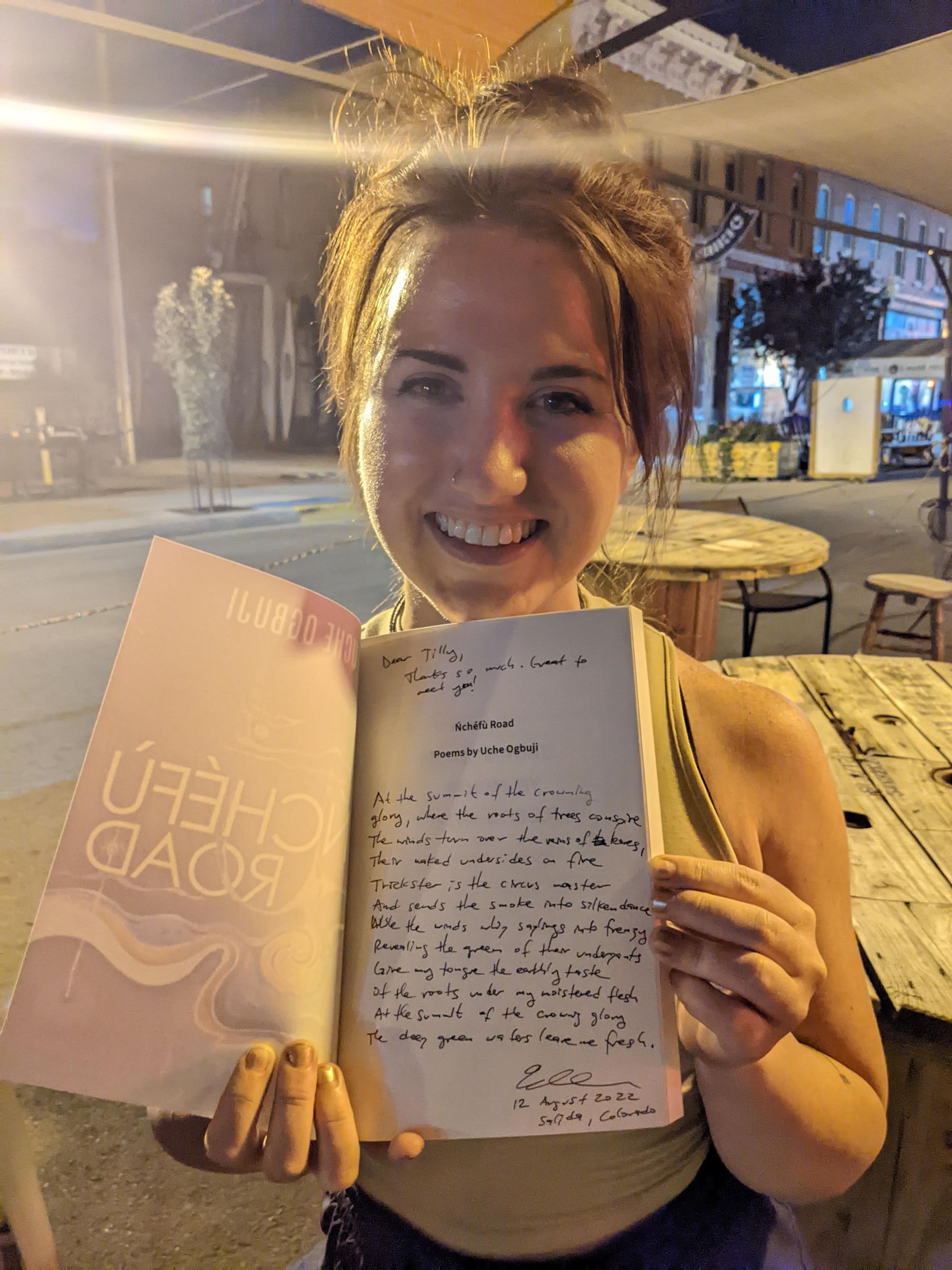
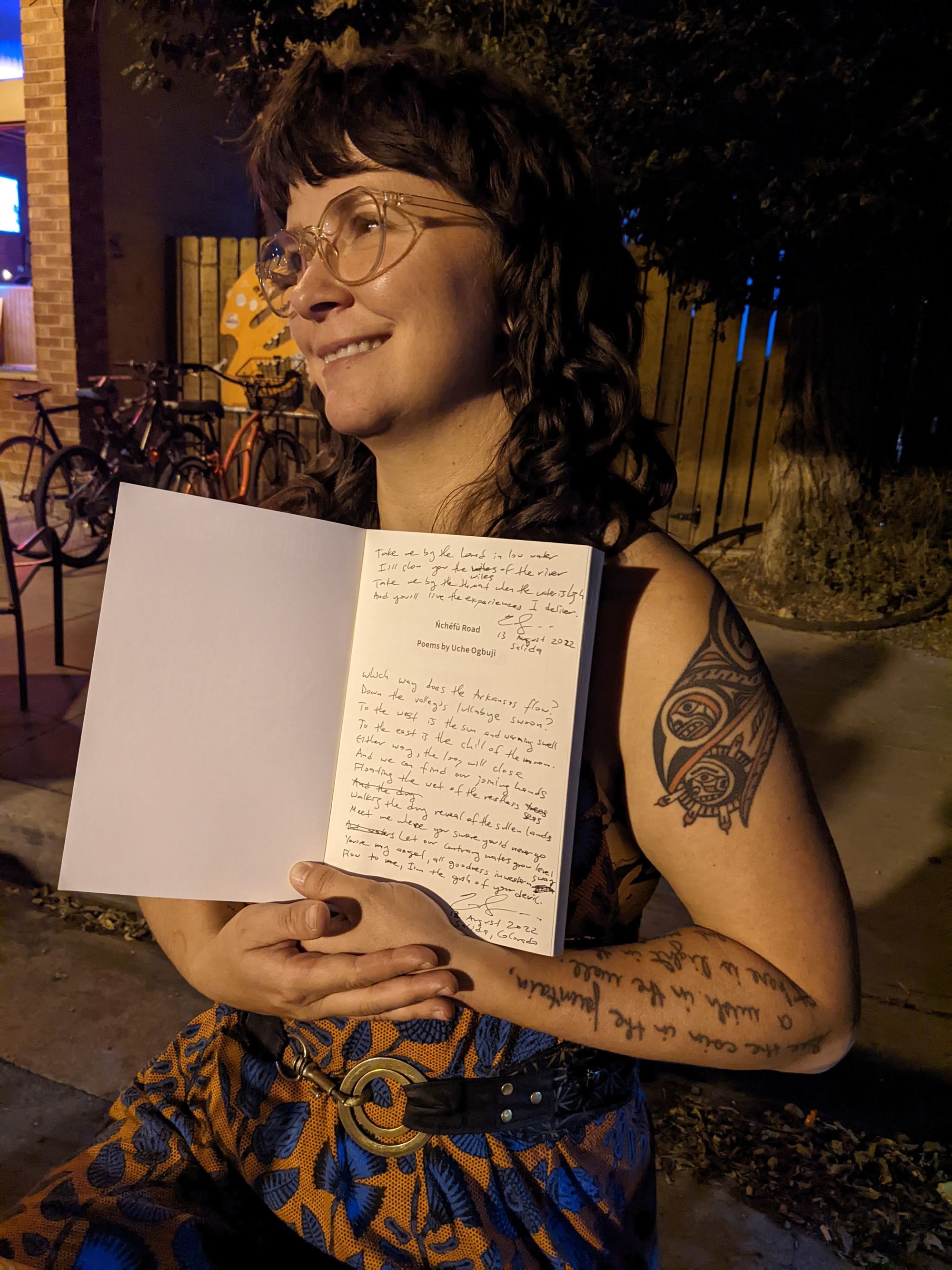
My dear hosts in Salida were Diane and Jim Baker, and Diane and I had a conversation about how innate rhythm and music are, certainly in West African cultures which I can speak most directly about, and really cultures throughout sub-saharan Africa. I first learned the "Ényíḿbà Ényí, (Ǹzọ̀gbú-Ǹzọ̀gbú)" chant you see in the above video in secondary school in Nigeria. It's also a war cry, but when you are cutting grass with a machete for chores or keeping a rhythm on step on the way back from the borehole with a full bucket of water balanced on your head, and determined not to spill a single drop, you go through all corners of the repertoire with your mates. (Recently, while we were in Iceland's Blue Lagoon my kids found themselves entertained by how others were entertained by my wading around with a cup of cider balanced on my head). I didn't sing out, but yes, I had those unforgotten childhood cadences working through my motor system.
Diane mentioned a documentary she'd seen on this topic: "When The Moment Sings The Muse Within". There won't be much new in it for anyone who's spent time on The Continent, but it does seem to fascinate people just how inseparable we are, ńdụ̀ from égwú (life from existence).
But we are the multitude, and our memento is music and movement.
Our mutiny is the moon in movement.
Dance with us—égwú! Or drag along in your darkness.
Our rhythms are the richness. Our footfalls full ground.
—Uche Ogbuji - from "Le Freak Musique Afrique" (Ńchéfù Road)
That same "Ényíḿbà Ényí, (Ǹzọ̀gbú-Ǹzọ̀gbú)" chant makes itself prominently into a poem in the Ojukwu section of Ńchéfù Road. Arthur Nortje tells of men turned to ghosts, but of course, in my paternal Igbo and maternal Umon cultures, ghosts are an important part of the framework against which we steady ourselves as we make our way in the world. In my pieces of white paper I invoke the black magic eloquence of three great Igbo elders, not only Ojukwu leader of Biafra, but also Azikiwe, founding father of Nigeria, and Okigbo, post-colonial Africa's greatest poet.
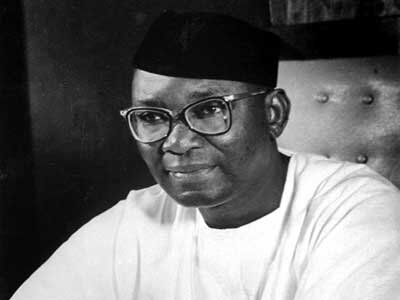
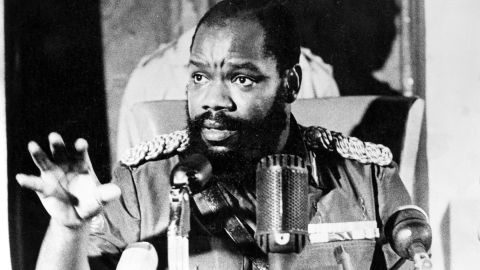
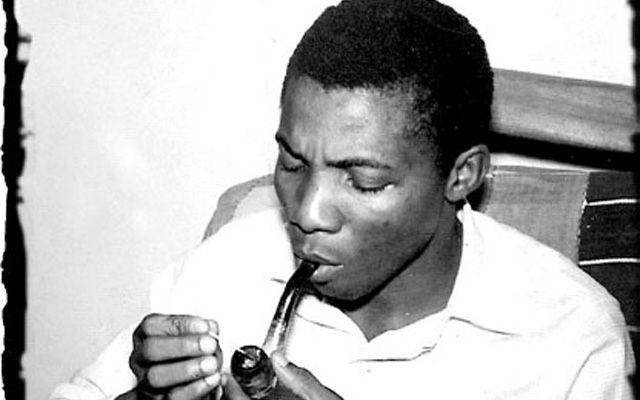
There are also prominent appearances by Patrice Lumumba, and, of course my parents.
Remember when books were paper and lay in the library?
Just kidding with the title, but a little old fogeyism never gets…old, does it? I opened this newsletter (Ọ́nwá atụ̀ọ́!) with a reference to Achebe's Arrow of God, and I highly recommend that book (OK, any book by Achebe). One way to read it is by borrowing it from your local public library. The thing is, though, that in my recent line of work I've come to realize how few people know that a library's rich resources are probably no more than a few miles away from them. It's an interesting case of how technology can be part of a problem and a solution at the very same time, especially if you're interested in the world of books and media.
If you are over forty you probably remember using card catalogs, which indexed books by title, author and subject. These bits of information which help people find books are called metadata, while the content of the books themselves have been relentlessly digitized into data by publishers, Google, the Internet Archive, and others. This is a more recent development, though. Back in the 60s librarians devised a scheme for managing catalog metadata in computers, and this is why over time, you started to see paper card catalogs disappear, replaced by computers.
Unfortunately, librarians were almost too far ahead of their time, and as other industries started to use computers, culminating in our modern internet, metadata management drifted in much different ways than those pioneering librarians devised. It became difficult for library metadata to assert its value on the web where suddenly everyone had gone to find whatever they were seeking. This has done a lot to hurt the relevance of libraries in contemporary life. The volume doesn't help. You'd be amazed at how much metadata a single item, such as a book, generates, never mind a full catalog us maybe a million items. It so happens that managing large volumes of metadata has been a key speciality of mine since the late 90s, and around a decade ago the company I co-founded worked with the Library of Congress and some other national libraries and organizations to develop a modernized form of metadata, called Bibliographic Framework ("BIBFRAME"), which is more suited to the web.
What does this actually mean to book and medium lovers? Well, as a result of developing BIBFRAME and working with libraries to convert their catalogs to the format, my company has been able to create feeds used by Google in search engine results to help you not only find where they can buy a book, but also where you can borrow it from a nearby library.
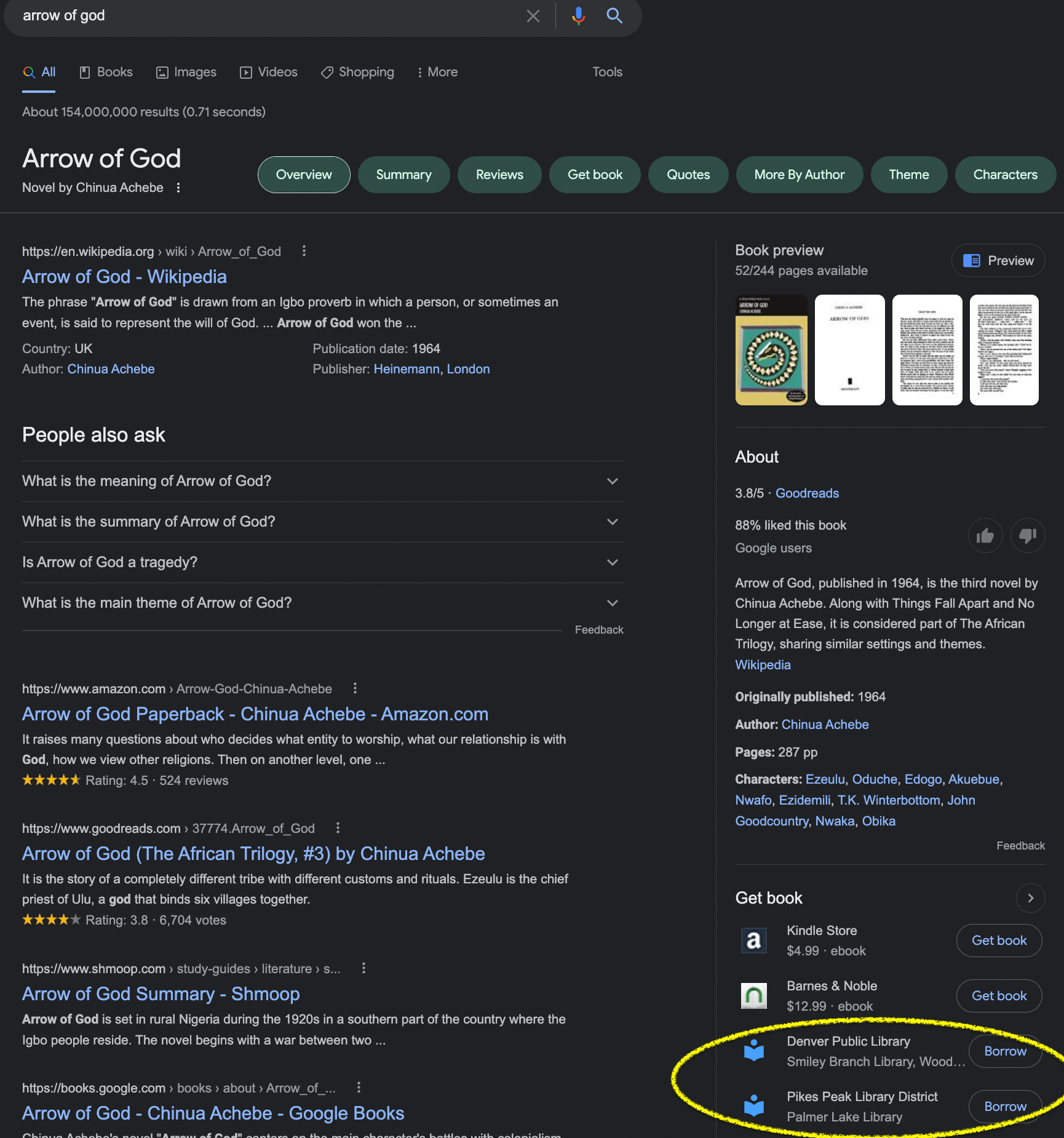
Try that out next time you're looking for a book. Our software works with the many things libraries hold for their communities (from guitars to laptops and beyond), but the ISBN-based feed is the only one Google wants, for now. It's been gratifying to work on a project to help install libraries in one of the most valuable pieces of real estate on the internet. I got my start in both tech and in poetry and in a public (Luton), and a university (Nsukka) library, respectively.
Song for the road
Song for the road
If, my mate, you can read the veins of a leaf
For the vee-splayed wake of a boat
Then you're wending with me on the same sacred stream
We feel firm to our feet as a road.
Aye the step or the swim takes us from origin
Through the presents our futures forsake
And where we must go is the devil to know
With no less wretched clue than our wake.
I hope, whether from a library of through purchase, you get your hands on that paper, Ńchéfù Road, and that you enjoy the dance; no hurry in understanding. If you'd like to groove to the égwú in person, I have a few events coming up.
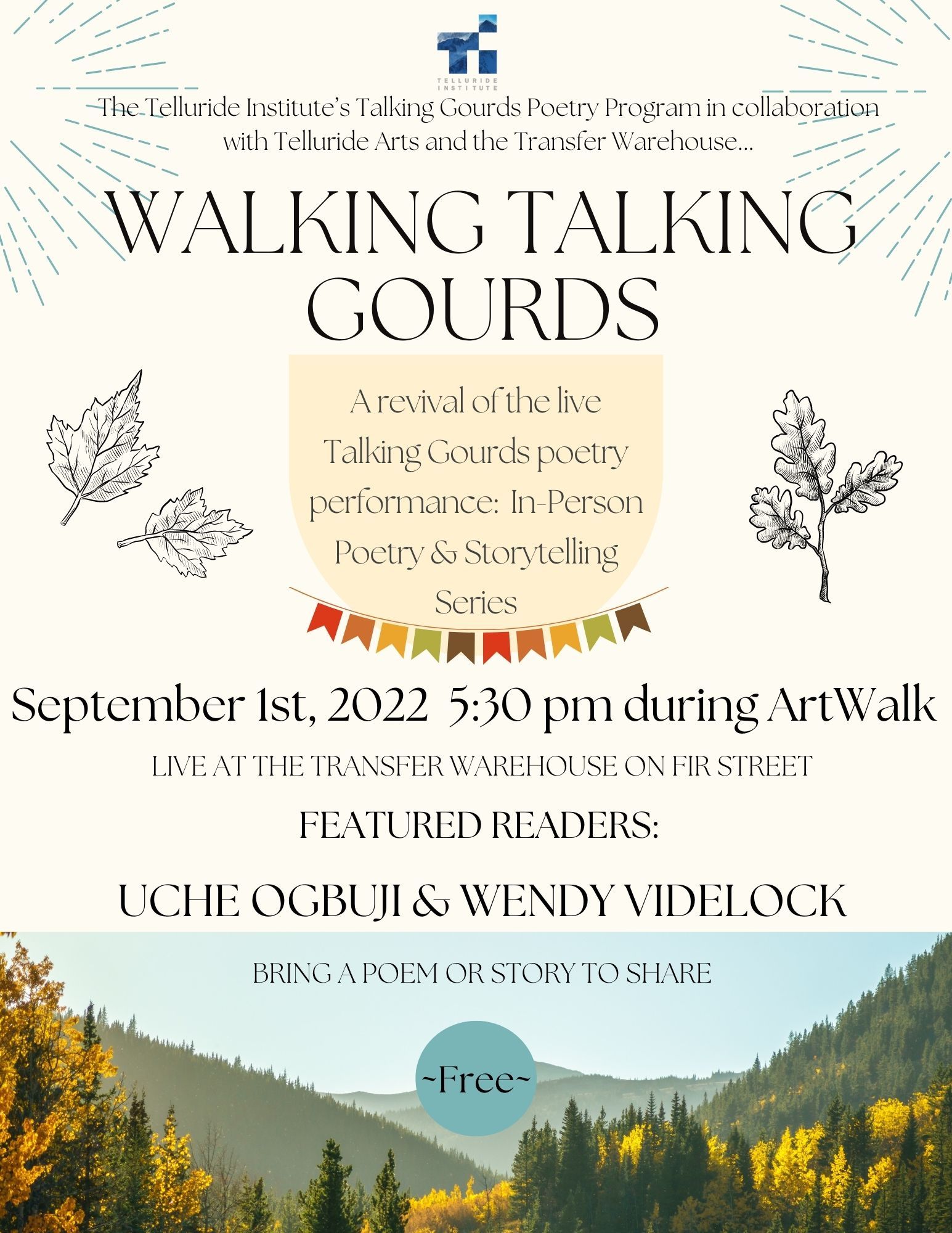
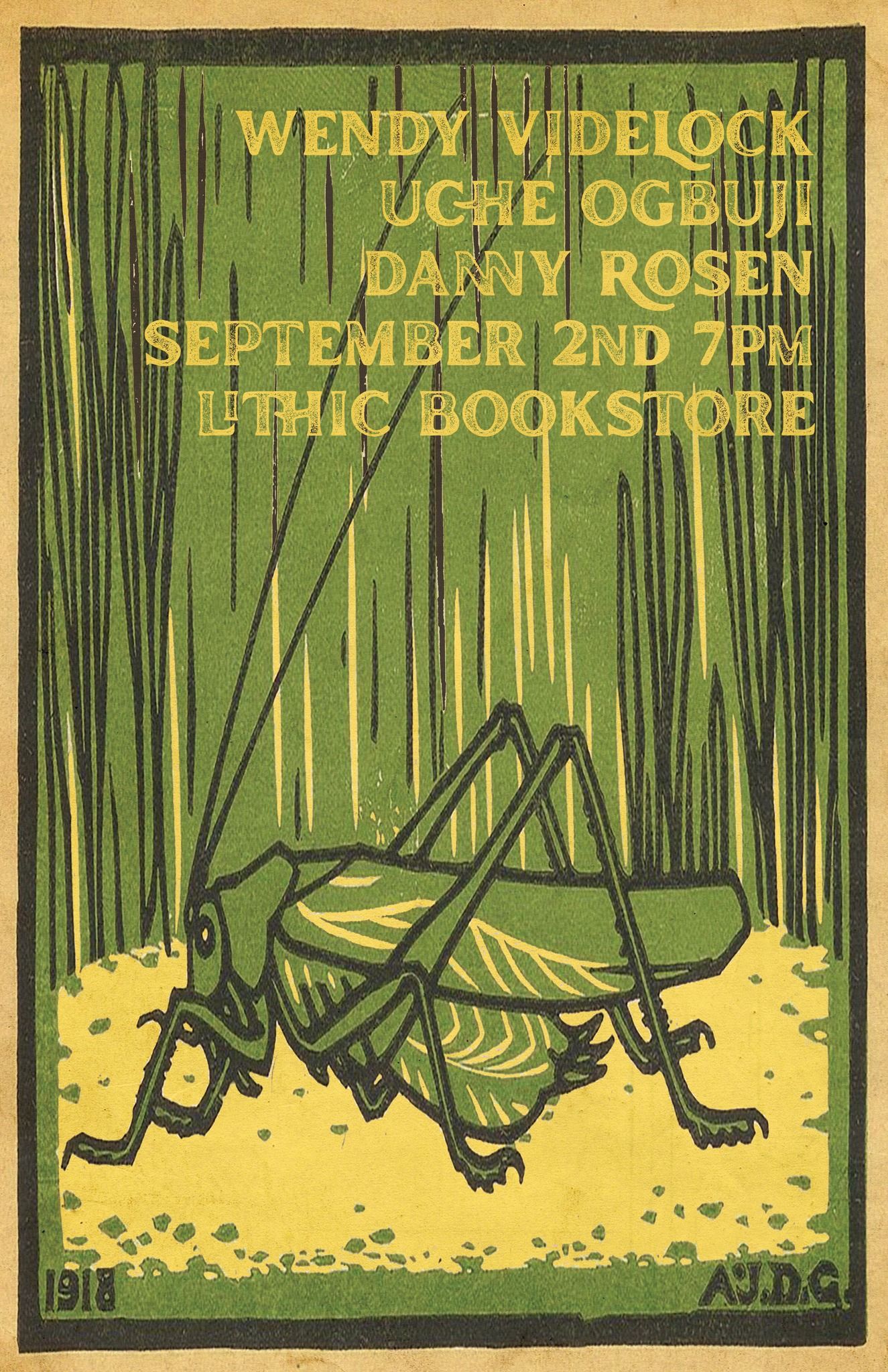
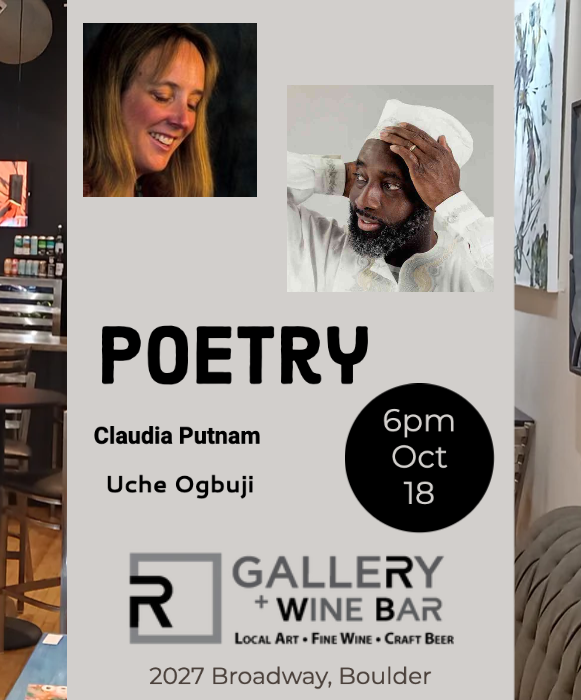
Here once again are a few new song recommendations:
❧ I just discovered Vancouver soul songstress the della kit, and looking in (feat. Scarub) is a great taste of what I'm digging so hard
❧ From The Continent, Immy Owusu - Brown Supremacy, a Zamrock sample artfully styled out with a bit of laid-back psychedelia
❧ For grown B-Boys & B-Girls: a whale of a combination: Your Old Droog & Madlib - The Return Of Sasquatch. Yes, yes, ya'll!
Please do consider sharing this newsletter with others, and subscribing, if you haven't (button in the lower right). Always something new to listen to, some new play on words, a fresh take for tech's sake, with the side sauce of odd juxtapositions. Dá àlụ́-nu!
❧ Égwú 🪘 Ókwú ✍🏿 Ígwè 📡 Ńdụ̀ ❣️
